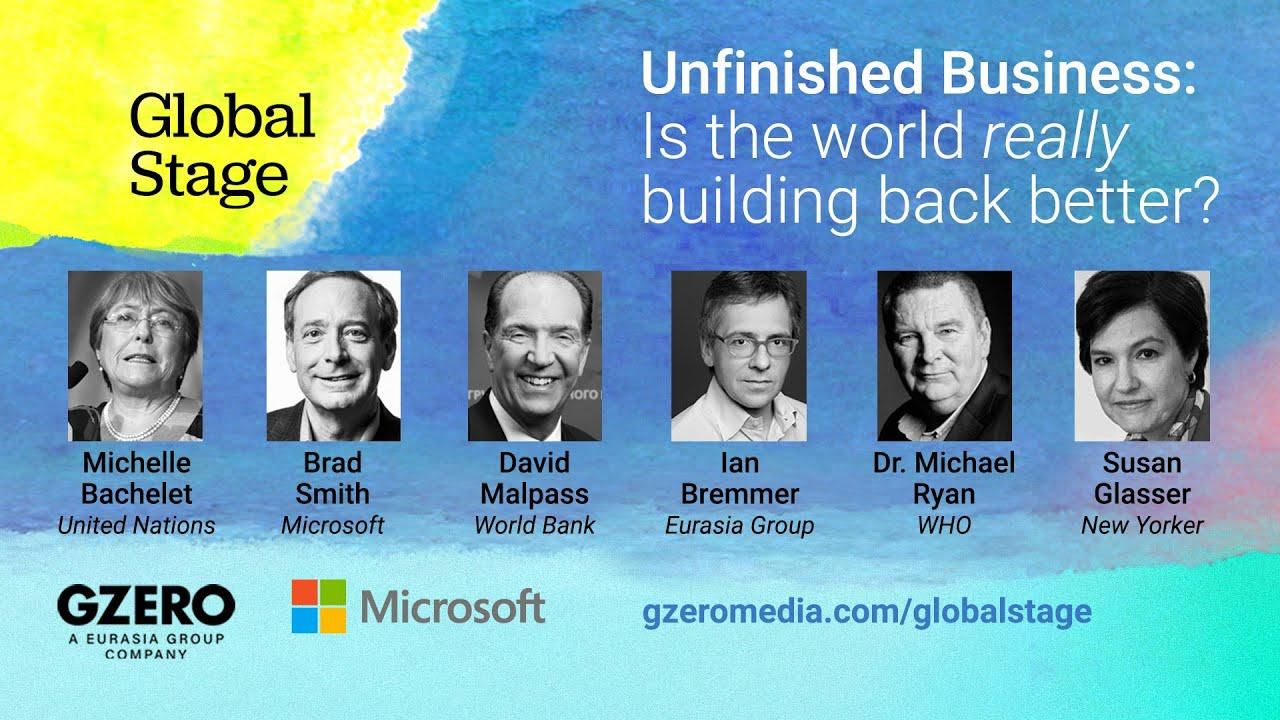Eighteen months later, some countries are already recovering from COVID, while others are still in the thick of it. What's the current state of play on vaccines, what's holding up distribution, will the world emerge stronger or weaker, what should the private sector do, and has Biden delivered on US leadership expectations?
Top leaders from the United Nations, the WHO, the World Bank, and Microsoft weighed in during a Global Stage virtual conversation hosted by GZERO Media in partnership with Microsoft during the 76th UN General Assembly, moderated by The New Yorker's Susan Glasser.For Dr. Mike Ryan, head of emergencies at the World Health Organization, one big obstacle is vaccine hesitancy. And the worst part about it is, in his view, powerful people who weaponize misinformation to serve their own political or economic needs. We need to have a healthy debate about vaccines and their safety, he says, but ultimately "science needs to succeed over politics."
For his part, World Bank President David Malpass says that wealthy countries and more recently India's Serum Institute are producing so many vaccines that there will likely be enough stocks to inoculate the entire world by the end of the year. However, to accomplish that, he warns, the nations that need jabs must know when they'll get them so they can prepare the groundwork to get the shots in people's arms.
Even if we are able to vaccinate the world in time, UN human rights chief Michelle Bachelet, says that building back better after COVID shouldn't mean returning to the same world we had before the pandemic. What we had back then, she explains, were political, social, and economic systems that didn't respond to people's needs — now we can either break through them, or break down to become an (even more) unequal world.
Building back better is also about the private sector. The question is not if but rather how corporations will get involved. Brad Smith, president of Microsoft, believes the private sector has a big role to play in helping to roll out COVID vaccines. But the most important thing it can do, he says, is collaborate effectively with the public sector — with a clear understanding of each side's role "so we each do what we're equipped to do and what we do best."
Many countries are disappointed about a multilateralist like Joe Biden not delivering on US vaccine exports that the rest of the world desperately needs. But it doesn't surprise Ian Bremmer, who says Biden upset his allies the same way by withdrawing so abruptly from Afghanistan or leaving the French out of the AUKUS loop. For Bremmer, Biden, initially viewed as way more competent and trustworthy than Donald Trump, is now one of the least trusted US presidents in recent history — apart from Trump himself — because whatever he says, his international leadership is "all focused at home."
More For You
Is China’s economic model reaching a breaking point? In GZERO’s 2026 Top Risks livestream, Cliff Kupchan, Chairman of Global Macro at Eurasia Group, highlights mounting pressures on the Chinese economy.
Most Popular
2026 is a tipping point year. The biggest source of global instability won’t be China, Russia, Iran, or the ~60 conflicts burning across the planet – the most since World War II. It will be the United States.
While surgeons remain fully in control, technological advances are expanding the use of surgical robots in operating rooms. As adoption accelerates, so do the expectations for patient outcomes and surgical care. Track medical innovation trends with Bank of America Institute.
Europe enters 2026 under mounting strain as it confronts external threats, internal political pressures, and a weakening relationship with the United States. In GZERO’s 2026 Top Risks livestream, Mujtaba Rahman, Managing Director for Europe at Eurasia Group, describes a continent that is “exhausted, fatigued, weak, and vulnerable.”
